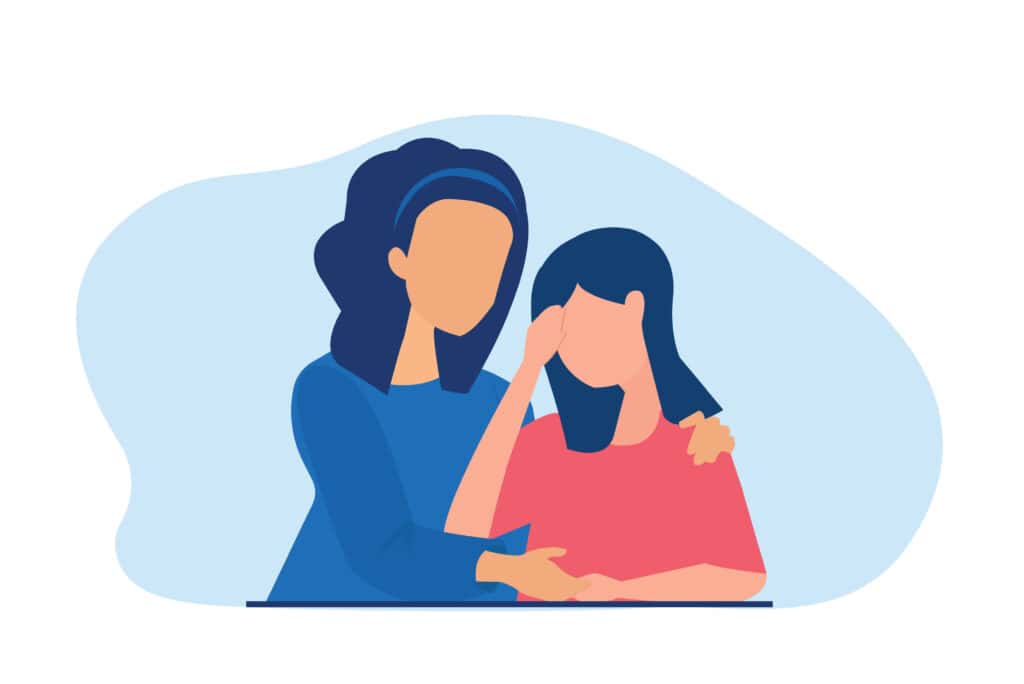FAQs about Dating Violence & Teenagers
These are frequently asked questions for Dr. Jill Murray, psychologist and author of numerous books on the topic of dating violence, including her latest, But He Never Hit Me: The Devastating Cost of Non-physical Abuse to Girls and Women. “Nobody wants to believe that their child would ever be involved with an abuser, but the reality is, many young people are in abusive dating relationships,” says Dr. Murray.
How Do You Know? What Can You Do?
Consider the Facts
Consider findings from the Tween and Teen Dating Violence and Abuse Study conducted by Teenage Research Unlimited (TRU) in 2008. More than 1,600 tween and teens participated in this online survey about dating and relationships.
- Nearly half of 11 to 14-year-olds have been in a dating relationship.
- A strong majority (62 percent) said they knew friends who had been verbally abused (called stupid, worthless, ugly, etc.) by a boyfriend or girlfriend.
- Two in five (41 percent) knew friends who had been called names, put down or insulted via cell phone, IM, social networking sites, etc.
- One in five 13 to 14-year-olds in relationships said they knew friends and peers who had been struck in anger (kicked, hit, slapped or punched) by a boyfriend or girlfriend.
- One in four tweens said dating violence – physically hurting relationship partners – is a serious problem for people their age.
- Among all teens who were sexually active by age 14; 69 percent reported having gone through one or more types of abuse in a relationship, with one in three reporting physical abuse.


- Notably, most parents who said they hadn’t talked to their tween about relationships (70 percent) said it’s because their child is too young.
“The findings from this research are startling,” says Dr. Murray. “We are dealing with behavior that is harmful and has great potential to follow young people into their adult dating relationships. Parents need to wake up and realize that they play a critical role in helping their child know the qualities of a healthy dating relationship and the warning signs of an abusive one.”
Several recent incidents involving dating violence have received national attention in the media. Even though some of these girls realized their relationships weren’t healthy, they did not appear to understand the danger they were in even after the break up.
Parents Need to Teach Healthy Relationships
“I am convinced that we must start teaching our children at a very early age how to recognize a healthy versus unhealthy relationship,” says Dr. Murray. “Two years of age is not too early to begin teaching your children that love is a behavior as is friendship and respect. It is up to you to model what that looks like.”
If parents never talk with their children about respecting their bodies, about how to treat a member of the opposite sex or what the appropriate age is to begin dating, they are left to make their own decisions, and the results are usually not good. “I tell parents that they should be having discussions with their children about dating as a natural progression of their ongoing conversations about healthy relationships,” says Dr. Murray.
What Are the Warning Signs?
“Many people in destructive relationships don’t recognize them for what they are,” says Dr. Murray. “Destructive relationships can occur with parents, children, co-workers, supervisors, male and female friends, siblings, a spouse or significant other. The relationship does not have to be violent and frequently is not. Just because you don’t have a black eye or a broken arm does not mean the relationship isn’t destructive.”
While there has been an increase in girls abusing boys, statistics indicate it is girls who are more often victims of dating abuse.
What Should Parents be Watching For?
Be wary if your teen…
- Makes excuses for the boyfriend’s or girlfriend’s inappropriate behavior
- Had more friends prior to dating
- Seems afraid of making the boyfriend or girlfriend angry
- Spends a lot of time crying alone
- Apologizes for things he or she has never done in the relationship.



Additionally, pay attention if you notice that…
- The boyfriend or girlfriend seeks to isolate your teen from family and friends
- The boyfriend or girlfriend is texting at all hours of the day and night, wanting to know what your teen is doing, who your teen is with, what your teen is wearing, etc.
- The boyfriend or girlfriend is jealous and blames your teen for things that aren’t going well in the relationship
- Your teen’s friends are coming to you, saying they are concerned.
These are all warning signs that should be taken seriously. “Your teen should not be afraid of making her boyfriend mad, nor should she be crying or in constant angst about her relationship,” says Dr. Murray. “Teen dating relationships should be fun and happy. Teens also need to understand that if their boyfriend or girlfriend is jealous, that is not the same as love. Jealousy is about insecurity.
How Can Parents Help?
“The most important thing a parent can do is be the parent your child needs you to be, starting at birth,” says Dr. Murray. “One of the biggest hindrances to children is parents who do not take charge in their own home because they so desperately want their children to like them and think they are cool. We need parents to step up to the plate and be the leaders in the household. Teach your children right from wrong and let them experience the consequences for inappropriate behavior. It is not appropriate for your child to tell you what they are or are not going to do — even during the teenage years.”
As the parent, you should know who your child likes. If your teen is going out on a date, it is appropriate for you to expect to meet the date prior to them going out. It is also appropriate to talk with his or her parents even though your teen tells you it is embarrassing and that nobody else’s parents do that. If you do these things and still feel uneasy about your teen going on the date with the person, do not allow him or her to go. It is inappropriate for your teen to meet up with a guy or girl at the mall or movie theater in order to avoid you having to meet them.
“It is important for your daughter to understand that relationships can be abusive in ways other than physical violence,” says Dr. Murray. “Emotional, psychological, spiritual, financial and verbal abuse can be just as destructive as physical violence.”
One of the most common forms of non-violent abuse is text messaging. Dr. Murray advises parents to be aware of what is happening with their teens’ cell phones. Significant texting goes on between midnight and 5 a.m., and most of it is not healthy. Parents should check their teens’ cell phone use, both calls and texting in the middle of the night, and have a discussion about those items. Dr. Murray advises parents that there is no need for children to have their phones when they go to bed. Consider a central location for cell phone check-in before bedtime. If they complain, saying that they use their phone alarm to get up in the morning, purchase an alarm clock for that exact purpose.
Our children are growing up in a world that is radically different than the world we grew up in even a decade ago. It is your job as the parent to stand strong and be the parent your child needs you to be.
“I can tell you now that as you provide structure and guidance, your children are probably not going to appreciate your words of wisdom at the moment,” says Dr. Murray. “But that isn’t what is important anyway. While our children may think they have all the answers, they don’t, and it is up to us to make sure we take good care of them in these formative years in order to prepare them for life and relationships in the real world.”
Julie Baumgardner
Julie Baumgardner is the executive director of First Things First, a research and advocacy organization dedicated to strengthening families through education, collaboration and mobilization. She can be reached at julieb@firstthings.org.

